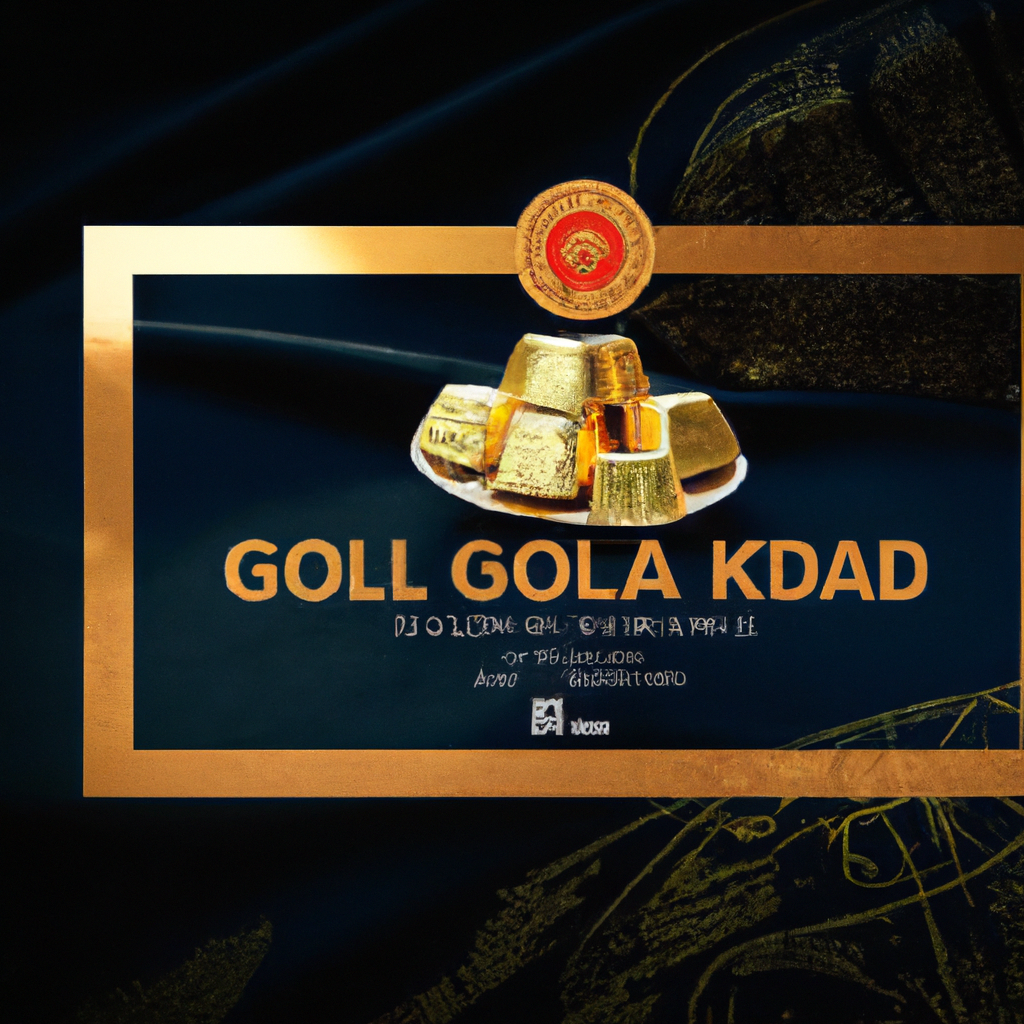If you’ve ever wondered about the role of the gold market in Malaysia’s economy, you’re in for an engaging and informative read. As a fund manager and gold investment expert, I’ll take you on a journey through the intricacies of this fascinating market. From exploring the historical significance of gold in Malaysia to delving into its current role as a crucial economic pillar, this article will provide you with valuable insights and a deeper understanding of how gold influences Malaysia’s economy. So, grab a cup of coffee, sit back, and let’s dive into the world of the gold market in Malaysia.

Overview of Malaysia’s Economy
Malaysia’s economy is considered one of the most dynamic in Southeast Asia. It has enjoyed steady economic growth, driven by a diverse range of sectors such as manufacturing, services, and tourism. The country has successfully transformed itself from a primary commodity exporter to a major industrial and trading hub.
GDP Growth and Composition
Over the years, Malaysia has experienced robust economic growth. Its GDP growth rate has averaged around 5% over the past decade, making it one of the fastest-growing economies in the region. The country’s GDP composition is diverse, with key sectors including manufacturing, services, agriculture, and construction contributing to its economic output.
Exports and Imports
Malaysia’s economy heavily relies on international trade, with both exports and imports playing a crucial role. The country is known for its export-oriented manufacturing sector, which produces a wide range of goods such as electronic components, petroleum products, and palm oil. Major trading partners include China, the United States, and Singapore.
Currency Stability
Maintaining currency stability is vital for Malaysia’s economy. The Malaysian Ringgit (MYR) has generally remained stable, thanks to the prudent monetary policies implemented by the central bank. Currency stability enhances investor confidence, promotes international trade, and supports economic growth.
Introduction to the Gold Market
The gold market, both globally and in Malaysia, holds significant importance in various aspects. It is a thriving market that attracts traders, investors, and individuals for different purposes.
Definition and Types of Gold Market
The gold market refers to the buying and selling of gold, including physical gold and gold-related financial products. It comprises various segments, such as the spot market, futures market, and over-the-counter (OTC) market. Gold can be traded in the form of bars, coins, jewelry, and exchange-traded products (ETPs).
Gold Market Participants
The gold market involves a wide range of participants, including individuals, investors, jewelers, bullion banks, central banks, and government entities. Each participant plays a distinct role in shaping the dynamics of the gold market. For example, individuals and investors use gold as a store of wealth or for investment purposes, while jewelers utilize it for crafting exquisite jewelry.
Size and Scope of the Gold Market
The global gold market is vast, with a size and scope that spans continents. As of recent data, the total global gold holdings stand at around 197,576 tons, valued at approximately $10 trillion. In Malaysia, the gold market exhibits significant activity, driven by strong cultural and investment demand.
Historical Significance of Gold in Malaysia
Gold holds a deep-rooted historical significance in Malaysia, embedded in its culture, religion, and traditional practices.
Cultural and Religious Importance
Gold has been worshipped and cherished by various communities in Malaysia for centuries. In Malay culture, gold holds significance during weddings and festivals, symbolizing prosperity, love, and commitment. Additionally, gold plays a prominent role in Hindu and Chinese cultural celebrations, representing auspiciousness and good fortune.
Gold as a Store of Wealth
Throughout history, gold has been viewed as a reliable store of wealth in Malaysia. Families often pass down gold jewelry from generation to generation, considering it a form of financial security. Its enduring value and limited supply make it an attractive option for preserving wealth over time.
Traditional Use in Jewelry and Ornaments
Jewelry adorned with gold has been an integral part of Malaysian traditions and customs. Intricate gold jewelry designs, such as necklaces, bracelets, earrings, and bangles, are worn during weddings, cultural events, and religious ceremonies. The craftsmanship and beauty of gold jewelry reflect the rich heritage and artistic prowess of Malaysian artisans.
Gold Mining and Production in Malaysia
Malaysia has a long history of gold mining, with gold discoveries dating back to the 19th century. However, the country’s gold production has been relatively modest compared to other major gold-producing nations.
Overview of Gold Production
Malaysia’s gold production has been sporadic, mainly driven by small-scale artisanal mining operations. The country’s gold output is influenced by factors such as economic conditions, mining technology, and environmental regulations. While the production volume may be modest, the potential for future expansion exists.
Major Gold Mines in Malaysia
Some of Malaysia’s notable gold mines include the Raub Australian Gold Mine, the Selinsing Gold Mine, and the Penjom Gold Mine. These mines have contributed to the country’s gold production and have attracted investment in the mining sector. However, it is essential to note that gold mining in Malaysia faces various challenges.
Challenges and Opportunities in Gold Mining
Gold mining in Malaysia encounters challenges such as limited reserves, high operational costs, and strict environmental regulations. However, advancements in mining technology and strategic partnerships offer opportunities for sustainable and responsible gold mining practices. Proper planning and collaboration can help overcome these challenges and unlock the potential of Malaysia’s gold resources.

Gold Imports and Exports
Malaysia’s gold market is not solely dependent on domestic gold production. The import and export of gold play a vital role in meeting the country’s demand and driving economic activity.
Trends in Gold Imports and Exports
Malaysia imports gold to supplement domestic production and meet the demand from various sectors, particularly jewelry manufacturing and investment. The country also exports gold to international markets, capitalizing on its craftsmanship and refining capabilities. Tracking import and export trends helps monitor the dynamics of the gold market and its impact on the economy.
Major Trading Partners
Malaysia engages in gold trade with various countries, both as importers and exporters. Major trading partners include countries such as Switzerland, India, Singapore, and the United Arab Emirates. These trading relationships facilitate the flow of gold into and out of Malaysia, supporting the functioning of the gold market.
Government Regulations and Policies
To ensure the smooth operation of the gold market and protect the interests of consumers and participants, the Malaysian government has implemented regulations and policies. These regulations focus on areas such as gold purity standards, licensing requirements for gold-related businesses, and measures to prevent illegal gold trafficking. Such regulations contribute to market transparency, consumer protection, and fair trade practices.
The Role of Gold in Malaysia’s Financial System
Gold’s significance extends beyond cultural and aesthetic considerations. It plays a crucial role in Malaysia’s financial system, offering stability and diversification opportunities.
Gold Reserves and Central Bank
The central bank of Malaysia, Bank Negara Malaysia, maintains gold reserves as part of its foreign exchange reserves. Holding gold reserves provides the central bank with a tangible asset that can help diversify its investment portfolio and provide stability during times of economic uncertainty. Gold reserves contribute to the overall stability of the country’s financial system.
Gold as a Hedge against Inflation
Gold is often viewed as a hedge against inflation due to its historical ability to maintain value during periods of rising prices. In Malaysia, where inflation can pose challenges to the economy, individuals and investors turn to gold as a means of protecting their purchasing power. By investing in gold, they aim to mitigate the potential erosion of wealth caused by inflation.
Gold-Backed Investment Products
In Malaysia, there are various investment products available that allow individuals and investors to gain exposure to gold without physically owning it. These gold-backed investment products, such as gold savings accounts, gold exchange-traded funds (ETFs), and gold certificates, provide a convenient and accessible way to invest in gold. They offer potential returns based on the performance of gold prices, offering investors an avenue for diversification and potential capital appreciation.

Gold Market Manipulation and Regulation
As in any financial market, the gold market is susceptible to manipulation and fraudulent activities. Regulating the market and implementing measures to protect market integrity is crucial.
Price Fixing and Market Manipulation
Instances of price fixing and market manipulation have been reported in the gold market globally. Manipulation can distort gold prices, impacting investor confidence and market stability. Recognizing the significance of fair market practices and ensuring transparency is essential for maintaining the integrity of the gold market.
Government Initiatives for Market Regulation
To promote a fair and transparent gold market, governments play a vital role in implementing regulations and initiatives. In Malaysia, the government collaborates with regulatory bodies such as the Securities Commission and the Ministry of Domestic Trade and Consumer Affairs to safeguard the interests of market participants and enforce anti-manipulation measures.
Consumer Protection and Market Transparency
Ensuring consumer protection and promoting market transparency are fundamental aspects of gold market regulation. In Malaysia, authorities monitor the gold market to prevent fraudulent practices, investigate complaints, and ensure compliance with relevant regulations. Initiatives such as consumer education programs and mandatory gold labeling requirements contribute to market transparency and protect consumers’ rights.
Gold Market Trends and Investment Opportunities
The gold market experiences trends and fluctuations that can offer investment opportunities for individuals and investors seeking exposure to this precious metal.
Gold Price Volatility and Investor Sentiment
Gold prices are influenced by various factors, including global economic conditions, geopolitical tensions, and investor sentiment. The volatility of gold prices presents opportunities for investors to enter or exit the market based on their outlook and risk appetite. Understanding the underlying factors influencing price movements is essential for making informed investment decisions.
Investment Strategies and Risk Management
investing in gold requires careful consideration of investment strategies and risk management techniques. Various approaches, such as long-term investment, short-term trading, or systematic investment plans, can be employed based on investors’ goals and risk tolerance. Diversification across asset classes and regions can help manage risk and optimize portfolio performance.
Role of Gold in Portfolio Diversification
Gold’s unique characteristics make it an attractive addition to a well-diversified investment portfolio. Historically, gold has demonstrated a low correlation with other asset classes such as stocks and bonds, making it a potential hedge against market volatility. Including gold in a portfolio can help reduce overall risk and provide stability during turbulent market conditions.

Gold as a Safe Haven during Economic Uncertainty
Gold’s role as a safe haven asset becomes particularly relevant during times of economic uncertainty and financial crises.
Gold’s Performance during Financial Crises
Throughout history, gold has often performed well during financial crises as investors seek refuge in safe assets. During periods of economic downturn or market turbulence, gold has displayed resilience and maintained its value. This characteristic gives investors confidence in gold as a safe haven asset during times of economic uncertainty.
Benefits and Risks of Investing in Gold
Investing in gold offers several potential benefits, such as portfolio diversification, wealth preservation, and protection against inflation. Gold’s limited supply and enduring value contribute to its overall appeal as an investment asset. However, it is essential to note that like any investment, gold carries its own set of risks, including price volatility and liquidity concerns.
Gold’s Role in Risk Management
Gold can serve as an effective risk management tool within an investment portfolio. By allocating a portion of investment assets to gold, investors can potentially reduce the overall portfolio risk. During periods of economic instability or market downturns, gold’s performance may offset losses in other asset classes, offering stability and protection against downside risks.
The Future of the Gold Market in Malaysia
The gold market in Malaysia is poised for further development, driven by emerging trends, government initiatives, and sustainable practices.
Emerging Trends and Technologies
Advancements in technology, such as blockchain, are revolutionizing the gold market. Blockchain-based platforms enable transparent and secure gold transactions, enhancing market efficiency and reducing the risk of fraud. Additionally, emerging trends like digital gold ownership and mobile trading apps are making gold more accessible to a wider audience.
Government Initiatives for Gold Market Development
The Malaysian government recognizes the potential of the gold market and has undertaken initiatives to promote its development. These initiatives include fostering collaborations with international gold markets, providing incentives for gold-related businesses, and encouraging responsible mining practices. Such efforts aim to position Malaysia as a regional gold hub and attract investment in the industry.
Role of Gold in Sustainable Development
Responsible and sustainable practices are gaining importance in the gold mining and refining industry. Malaysia is actively working towards promoting sustainable gold mining practices, reducing environmental impacts, and ensuring the welfare of local communities. Responsible gold production contributes to sustainable development, offering long-term economic, social, and environmental benefits.
In conclusion, the gold market plays a significant role in Malaysia’s economy, intertwining cultural, financial, and industrial aspects. From its historical and cultural significance to its role as a store of wealth and a financial instrument, gold occupies a prominent position in Malaysian society. With ongoing advancements and government initiatives, the gold market in Malaysia is set to evolve, offering new opportunities and contributing to the country’s sustainable development.









